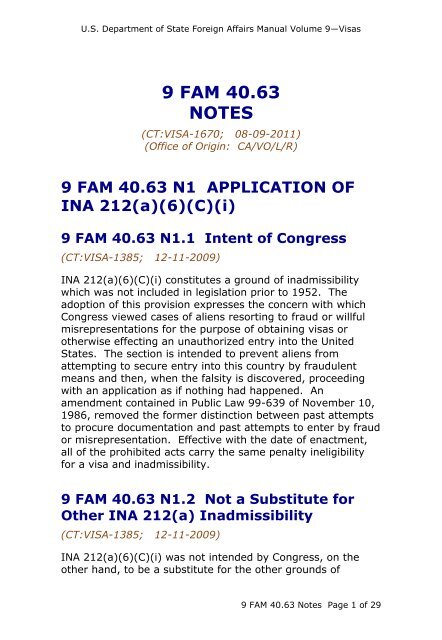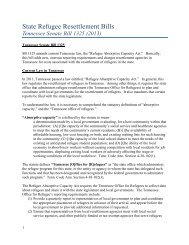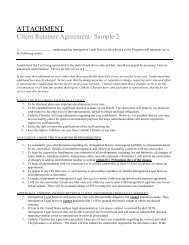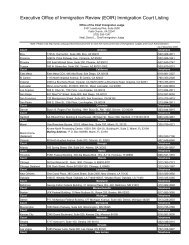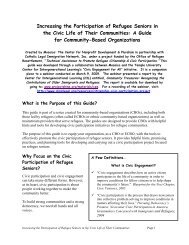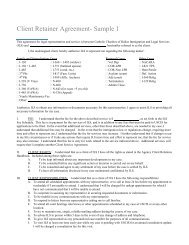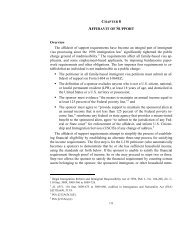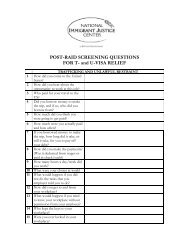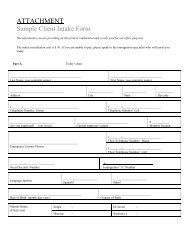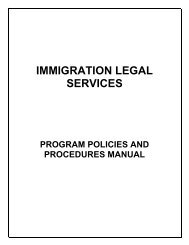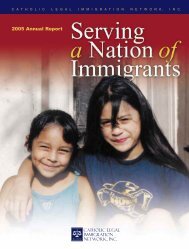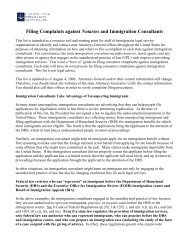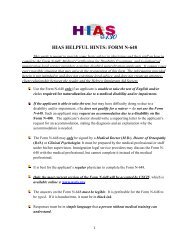9 FAM 40.63 Misrepresentation; Falsely Claiming Citizenship - Notes
9 FAM 40.63 Misrepresentation; Falsely Claiming Citizenship - Notes
9 FAM 40.63 Misrepresentation; Falsely Claiming Citizenship - Notes
You also want an ePaper? Increase the reach of your titles
YUMPU automatically turns print PDFs into web optimized ePapers that Google loves.
U.S. Department of State Foreign Affairs Manual Volume 9―Visas9 <strong>FAM</strong> <strong>40.63</strong>NOTES(CT:VISA-1670; 08-09-2011)(Office of Origin: CA/VO/L/R)9 <strong>FAM</strong> <strong>40.63</strong> N1 APPLICATION OFINA 212(a)(6)(C)(i)9 <strong>FAM</strong> <strong>40.63</strong> N1.1 Intent of Congress(CT:VISA-1385; 12-11-2009)INA 212(a)(6)(C)(i) constitutes a ground of inadmissibilitywhich was not included in legislation prior to 1952. Theadoption of this provision expresses the concern with whichCongress viewed cases of aliens resorting to fraud or willfulmisrepresentations for the purpose of obtaining visas orotherwise effecting an unauthorized entry into the UnitedStates. The section is intended to prevent aliens fromattempting to secure entry into this country by fraudulentmeans and then, when the falsity is discovered, proceedingwith an application as if nothing had happened. Anamendment contained in Public Law 99-639 of November 10,1986, removed the former distinction between past attemptsto procure documentation and past attempts to enter by fraudor misrepresentation. Effective with the date of enactment,all of the prohibited acts carry the same penalty ineligibilityfor a visa and inadmissibility.9 <strong>FAM</strong> <strong>40.63</strong> N1.2 Not a Substitute forOther INA 212(a) Inadmissibility(CT:VISA-1385; 12-11-2009)INA 212(a)(6)(C)(i) was not intended by Congress, on theother hand, to be a substitute for the other grounds of9 <strong>FAM</strong> <strong>40.63</strong> <strong>Notes</strong> Page 1 of 29
U.S. Department of State Foreign Affairs Manual Volume 9―Visasinadmissibility provided by the INA nor for grounds that donot exist in the INA. It should not be used to accomplishindirectly that which cannot be accomplished directly. Thesection was not intended to permit and must not become adevice for entrapment of aliens whom you might suspect tobe ineligible on some other ground(s) for which there is notsufficient evidence to sustain a finding of inadmissibility. Youshould always assess an applicant’s eligibility for a visa inaccordance with all INA provisions governing the eligibility fora visa or inadmissibility of certain specifically describedclasses. Bear in mind that aliens may not be denied visassimply because they do not seem particularly desirableindividuals as either immigrants or nonimmigrants.9 <strong>FAM</strong> <strong>40.63</strong> N1.3 Nature of Penalty(CT:VISA-1516; 09-14-2010)In applying the provisions of INA 212(a)(6)(C)(i), keep inmind the severe nature of the penalty the alien incurs:lifetime inadmissibility, unless a waiver is obtained. (See 9<strong>FAM</strong> <strong>40.63</strong> N9.) When considering whether to impose such adire penalty, keep in mind the words quoted by the AttorneyGeneral in his landmark opinion on this matter. (The Matterof S- and B-C, 9 I & N Dec. 436, at 447): "Shutting off theopportunity to come to the United States actually is acrushing deprivation to many prospective immigrants. Veryoften it destroys the hopes and aspirations of a lifetime, and itfrequently operates not only against the individualimmediately but also bears heavily upon his family in and outof the United States."9 <strong>FAM</strong> <strong>40.63</strong> N2 CRITERIA FORFINDING OF INADMISSIBILITY(CT:VISA-1385; 12-11-2009)In order to find an alien inadmissible under INA212(a)(6)(C)(i), it must be determined that:9 <strong>FAM</strong> <strong>40.63</strong> <strong>Notes</strong> Page 2 of 29
U.S. Department of State Foreign Affairs Manual Volume 9―Visas(1) There has been a misrepresentation made by theapplicant (see 9 <strong>FAM</strong> <strong>40.63</strong> N4);(2) The misrepresentation was willfully made (see 9 <strong>FAM</strong><strong>40.63</strong> N5); and(3) The fact misrepresented is material (see 9 <strong>FAM</strong><strong>40.63</strong> N6); or(4) The alien used fraud (see 9 <strong>FAM</strong> <strong>40.63</strong> N3) to seekto procure, has sought to procure, or has procured avisa, other documentation for admission into theUnited States (see 9 <strong>FAM</strong> <strong>40.63</strong> N7), or to receiveother benefit (referring to marriage fraud) providedunder the INA (see 9 <strong>FAM</strong> <strong>40.63</strong> N7).9 <strong>FAM</strong> <strong>40.63</strong> N3 DIFFERENTSTANDARDS FOR FINDINGS OF"FRAUD" OR "WILLFULLYMISREPRESENTING A MATERIALFACT"(CT:VISA-1516; 09-14-2010)a. The fact that Congress used the terms "fraud" and "willfullymisrepresenting a material fact" in the alternative indicatesan intent to set a lower standard than is required inmaking a finding of what is known in the law as fraud. Thedistinction between the two terms is not readily apparent.For the purposes of this section, the Board of ImmigrationAppeals has determined that a finding of "fraud" requires adetermination that the alien made a false representation ofa material fact with knowledge of its falsity and with theintent to deceive a consular or immigration officer.Further, the representation must have been believed andacted upon by the officer. (See Matter of G, 7 I & N 161,1956.) On the other hand, "material misrepresentation"includes simply a willful misrepresentation, which isrelevant to the alien's visa entitlement. It is not necessary9 <strong>FAM</strong> <strong>40.63</strong> <strong>Notes</strong> Page 3 of 29
U.S. Department of State Foreign Affairs Manual Volume 9―Visasthat an "intent to deceive" be established by proof, or thatthe officer believes and acts upon the false representation.(See Matter of S and B-C, 9 I & N 436, 448-449 (A.G.1961) and Matter of Kai Hing Hui, 15 I & N 288 (1975)).b. Most cases of inadmissibility under this section will involve"material misrepresentations" rather than "fraud" sinceactual proof of an alien's intent to deceive may be hard tocome by. As a result, the <strong>Notes</strong> in this section will dealprincipally with the interpretation of "materialmisrepresentation.”9 <strong>FAM</strong> <strong>40.63</strong> N4 INTERPRETATIONOF THE TERM "MISREPRESENTA-TION"9 <strong>FAM</strong> <strong>40.63</strong> N4.1 "<strong>Misrepresentation</strong>"Defined(TL:VISA-175; 01-15-1998)As used in INA 212(a)(6)(C)(i), a misrepresentation is anassertion or manifestation not in accordance with the facts.<strong>Misrepresentation</strong> requires an affirmative act taken by thealien. A misrepresentation can be made in various ways,including in an oral interview or in written applications, or bysubmitting evidence containing false information.9 <strong>FAM</strong> <strong>40.63</strong> N4.2 DifferentiationBetween <strong>Misrepresentation</strong> and Failure toVolunteer Information(TL:VISA-175; 01-15-1998)In determining whether a misrepresentation has been made,it is necessary to distinguish between misrepresentation ofinformation and information that was merely concealed by thealien's silence. Silence or the failure to volunteer information9 <strong>FAM</strong> <strong>40.63</strong> <strong>Notes</strong> Page 4 of 29
U.S. Department of State Foreign Affairs Manual Volume 9―Visasdoes not in itself constitute a misrepresentation for thepurposes of INA 212(a)(6)(C)(i).9 <strong>FAM</strong> <strong>40.63</strong> N4.3 <strong>Misrepresentation</strong>Must Have Been Before U.S. Official(CT:VISA-998; 08-26-2008)For a misrepresentation to fall within the purview of INA212(a)(6)(C)(i), it must have been practiced on an official ofthe U.S. Government, generally speaking, a consular officeror a Department of Homeland Security (DHS) officer.9 <strong>FAM</strong> <strong>40.63</strong> N4.4 <strong>Misrepresentation</strong>Must Be Made on Alien's Own Application(TL:VISA-175; 01-15-1998)The misrepresentation must have been made by the alienwith respect to the alien's own visa application.<strong>Misrepresentation</strong>s made in connection with some otherperson's visa application do not fall within the purview of INA212(a)(6)(C)(i). Any such misrepresentations may beconsidered with regard to the possible application of INA212(a)(6)(E).9 <strong>FAM</strong> <strong>40.63</strong> N4.5 <strong>Misrepresentation</strong>Made by Applicant's Attorney or Agent(CT:VISA-998; 08-26-2008)The fact that an alien pursues a visa application through anattorney or travel agent does not serve to insulate the alienfrom liability for misrepresentations made by such agents, if itis established that the alien was aware of the action beingtaken in furtherance of the application. This standard wouldapply, for example, where a travel agent executed a visaapplication on an alien's behalf. Similarly, an oralmisrepresentation made on behalf of an alien at the port ofentry by an aider or abettor of the alien's illegal entry will not9 <strong>FAM</strong> <strong>40.63</strong> <strong>Notes</strong> Page 5 of 29
U.S. Department of State Foreign Affairs Manual Volume 9―Visasshield the alien in question from inadmissibility under INA212(a)(6)(C)(i), irrespective of what penalties the aider orabettor might incur, if it can be established that the alien wasaware at the time of the misrepresentation made on his orher behalf.9 <strong>FAM</strong> <strong>40.63</strong> N4.6 Timely Retraction(CT:VISA-1670; 08-09-2011)A timely retraction will serve to purge a misrepresentationand remove it from further consideration as a ground for INA212(a)(6)(C)(i) and INA 212(a)(6)(C)(ii) inadmissibility.Whether a retraction is timely depends on the circumstancesof the particular case. In general, it should be made at thefirst opportunity. If the applicant has personally appearedand been interviewed, the retraction must have been madeduring that interview. If the misrepresentation has beennoted in a "mail-order" application, the applicant must becalled in for an interview and the retraction must be madeduring the course thereof. For this reason, aliens must bewarned of the penalty imposed by INA 212(a)(6)(C)(i) andINA 212(a)(6)(C)(ii) at the outset of every initial interview.Guidance may be sought through the advisory opinion process(CA/VO/L/A).9 <strong>FAM</strong> <strong>40.63</strong> N4.7 Applying the 30/60Day Rule(CT:VISA-1516; 09-14-2010)a. In determining whether a misrepresentation has beenmade, some of the most difficult questions arise fromcases involving aliens in the United States who conductthemselves in a manner inconsistent with representationsthey made to the consular officers concerning theirintentions at the time of visa application or to immigrationofficers when applying for admission. Such cases occurmost frequently with respect to aliens who, after havingobtained visas as nonimmigrants, either:9 <strong>FAM</strong> <strong>40.63</strong> <strong>Notes</strong> Page 6 of 29
U.S. Department of State Foreign Affairs Manual Volume 9―Visas(1) Apply for adjustment of status to permanentresident; or(2) Fail to maintain their nonimmigrant status (forexample, by engaging in employment withoutauthorization by DHS).b. To address this problem, the Department developed the30/60-day rule. This rule is intended to facilitateadjudication of these types of cases consistent with thestatutory mandates.c. Aliens who apply for adjustment of status pursuant to theINA are within the jurisdiction of the United States<strong>Citizenship</strong> and Immigration Services (USCIS) unless theapplication is abandoned upon the departure of the alienfrom the United States. If you become aware ofderogatory information indicating that an alien who hasapplied to USCIS to adjust nonimmigrant status in theUnited States may have misrepresented his or herintentions to you at the time of visa application or to theimmigration officer at the port of entry, you should bringthe derogatory information to the attention of theappropriate USCIS office that has jurisdiction over thechange of status application. Do not request an advisoryopinion from the Advisory Opinions Division (CA/VO/L/A) inthese cases, because it would not be binding on USCIS.d. With respect to the second category referred to above, thefact that an alien's subsequent actions are other than asstated at the time of visa application or entry does notnecessarily prove that the alien's intentions weremisrepresented at the time of application or entry. As tothose who fail to maintain status, you should alsorecognize that the precise circumstances under which thechange in activities or the overstay arose have animportant bearing on whether a knowing and willfulmisrepresentation was made. The existence of amisrepresentation must therefore be clearly and factuallyestablished by direct or circumstantial evidence sufficientto meet the "reason to believe” standard. Although indeedmore flexible than the judicial "beyond reasonable doubt”9 <strong>FAM</strong> <strong>40.63</strong> <strong>Notes</strong> Page 7 of 29
U.S. Department of State Foreign Affairs Manual Volume 9―Visasstandard demanded for a conviction in court, a "reason tobelieve” standard requires that a probability exists,supported by evidence which goes beyond mere suspicion.9 <strong>FAM</strong> <strong>40.63</strong> N4.7-1 Applying 30/60 Day RuleWhen Alien Violates Status(CT:VISA-1385; 12-11-2009)You should apply the 30/60-day rule if an alien states on hisor her application for a B-2 visa, or informs an immigrationofficer at the port of entry (POE), that the purpose of his orher visit is tourism, or to visit relatives, etc., and then violatessuch status by:(1) Actively seeking unauthorized employment and,subsequently, becomes engaged in suchemployment;(2) Enrolling in a program of academic study without thebenefit of the appropriate change of status;(3) Marrying and taking up permanent residence; or(4) Undertaking any other activity for which a change ofstatus or an adjustment of status would be required,without the benefit of such a change or adjustment.9 <strong>FAM</strong> <strong>40.63</strong> N4.7-2 Inconsistent ConductWithin 30 Days of Entry(CT:VISA-998; 08-26-2008)If an alien violates his or her nonimmigrant status in amanner described in 9 <strong>FAM</strong> <strong>40.63</strong> N4.7-1 within 30 days ofentry, you may presume that the applicant misrepresentedhis or her intention in seeking a visa or entry.9 <strong>FAM</strong> <strong>40.63</strong> N4.7-3 After 30 Days But Within60 Days9 <strong>FAM</strong> <strong>40.63</strong> <strong>Notes</strong> Page 8 of 29
U.S. Department of State Foreign Affairs Manual Volume 9―Visas(CT:VISA-1385; 12-11-2009)If an alien initiates such violation of status more than 30 daysbut less than 60 days after entry into the United States, nopresumption of misrepresentation arises. However, if thefacts in the case give you reasonable belief that the alienmisrepresented his or her intent, then you must give the alienthe opportunity to present countervailing evidence. If you donot find such evidence to be persuasive, submit acomprehensive report to the Advisory Opinions Division(CA/VO/L/A) for the rendering of an advisory opinion. (See 9<strong>FAM</strong> <strong>40.63</strong> N7.2).9 <strong>FAM</strong> <strong>40.63</strong> N4.7-4 After 60 Days(CT:VISA-998; 08-26-2008)When violative conduct occurs more than 60 days after entryinto the United States, the Department does not considersuch conduct to constitute a basis for an INA 212(a)(6)(C)(i)inadmissibility.9 <strong>FAM</strong> <strong>40.63</strong> N4.8 Evidence of Violationof Status(CT:VISA-1385; 12-11-2009)a. To find an alien inadmissible under INA 212(a)(6)(C)(i),there must be evidence that, at the time of the visaapplication or entry into the United States, the alien statedorally or in writing to a consular or immigration officer thatthe purpose of the visit to the United States was otherthan to work or remain indefinitely. Ordinarily, suchevidence would be in the form of an admission, frominformation taken from the alien's nonimmigrant visa (NIV)application, or a report by an immigration officer that thealien made such a statement (e.g., as would be found onthe DHS Form I-275, Withdrawal of Application/ConsularNotification). Additionally, all findings of inadmissibilityunder the 30/60-day guidelines described in 9 <strong>FAM</strong> <strong>40.63</strong>N4.7-1 through 9 <strong>FAM</strong> <strong>40.63</strong> N4.7-4 would require the9 <strong>FAM</strong> <strong>40.63</strong> <strong>Notes</strong> Page 9 of 29
U.S. Department of State Foreign Affairs Manual Volume 9―VisasDepartment's concurrence following submission of anadvisory opinion (AO) request.b. The burden of proof falls on the alien to establish that hisor her true intent was to visit, tour, etc. In the absence ofany further offering of proof by the alien to rebut thepresumption, a finding of ineligibility will result. You mustgive the alien the opportunity to rebut the presumption bypresentation of evidence to overcome it. If you aresatisfied that the presumption is overcome, and the alien isotherwise eligible, process the case to conclusion. If thepresumption is not overcome, submit a description of theevidence submitted by the alien in a report to CA/VO/L/A.The report must include evidence of the actualrepresentation; e.g.:(1) Evidence that the alien violated status within 30 days(see 9 <strong>FAM</strong> <strong>40.63</strong> N4.7-2);(2) Evidence of such misrepresentation from the actualvisa application or application for entry; or(3) The consul's statement that the applicant hasadmitted that he or she misrepresented the purposeof his or her visit on the visa application or to theimmigration officer.9 <strong>FAM</strong> <strong>40.63</strong> N5 INTERPRETATIONOF TERM "WILLFULLY"9 <strong>FAM</strong> <strong>40.63</strong> N5.1 “Willfully" Defined(TL:VISA-175; 01-15-1998)The term "willfully" as used in INA 212(a)(6)(C)(i) isinterpreted to mean knowingly and intentionally, asdistinguished from accidentally, inadvertently, or in an honestbelief that the facts are otherwise. In order to find theelement of willfulness, it must be determined that the alienwas fully aware of the nature of the information sought and9 <strong>FAM</strong> <strong>40.63</strong> <strong>Notes</strong> Page 10 of 29
U.S. Department of State Foreign Affairs Manual Volume 9―Visasknowingly, intentionally, and deliberately made an untruestatement.9 <strong>FAM</strong> <strong>40.63</strong> N5.2 <strong>Misrepresentation</strong> isAlien's Responsibility(TL:VISA-4; 11-19-1987)An alien who acts on the advice of another is considered to beexercising the faculty of conscious and deliberate will inaccepting or rejecting such advice. It is no defense for analien to say that the misrepresentation was made becausesomeone else advised the action unless it is found that thealien lacked the capacity to exercise judgment.9 <strong>FAM</strong> <strong>40.63</strong> N6 INTERPRETATIONOF TERM "MATERIAL FACT"9 <strong>FAM</strong> <strong>40.63</strong> N6.1 "Materiality" Defined(CT:VISA-1385; 12-11-2009)Materiality does not rest on the simple moral premise that analien has lied, but must be measured pragmatically in thecontext of the individual case as to whether themisrepresentation was of direct and objective significance tothe proper resolution of the alien's application for a visa. TheAttorney General has declared the definition of "materiality"with respect to INA 212(a)(6)(C)(i) to be as follows: "Amisrepresentation made in connection with an application fora visa or other documents, or with entry into the UnitedStates, is material if either:(1) The alien is inadmissible on the true facts; or(2) The misrepresentation tends to shut off a line ofinquiry which is relevant to the alien's eligibility andwhich might well have resulted in a properdetermination that he or she be inadmissible."(Matter of S- and B-C, 9 I & N 436, at 447.)9 <strong>FAM</strong> <strong>40.63</strong> <strong>Notes</strong> Page 11 of 29
U.S. Department of State Foreign Affairs Manual Volume 9―Visas9 <strong>FAM</strong> <strong>40.63</strong> N6.2 Independent Groundof Inadmissibility(CT:VISA-1516; 09-14-2010)The first part of the Attorney General's definition ofmateriality comprises those cases where the material factsdisclose a situation rendering the alien ineligible for a visa asa matter of law. These are known as independent orobjective grounds of inadmissibility. Objective grounds ofinadmissibility are those encompassed within the provisions ofINA 212(a)(1) through (10). Special circumstances are asfollows:(1) There are few circumstances under which theconcealment of the possible applicability of anindependent ground of inadmissibility may not bedeemed to be material to the applicant’s eligibility fora visa. There are a few grounds of inadmissibilitywhich contain provisions under which some aliensmay be relieved of ineligibility by operation of law.(2) This is true, for example, of INA 212(a)(2)(A)(i)(I)and 212(a)(3)(B). In judicial and administrativedecisions about the applicability of INA212(a)(6)(C)(i), a distinction has been drawnbetween those other provisions of INA 212 whichgrant relief from ineligibility as a result of anevaluation of all relevant factors pro and con, on theone hand, and those which provide reliefautomatically by standard operation of law. Theessence of these decisions, according to the AttorneyGeneral, is that:(a)The fact in question is material if the finaldetermination of relief would depend on anexercise in judgment (i.e., one cannotpredicate immateriality on the possibility thatthe exercise of judgment would have erasedthe ground of inadmissibility when it is alsopossible that the judgment could have gonethe other way);9 <strong>FAM</strong> <strong>40.63</strong> <strong>Notes</strong> Page 12 of 29
U.S. Department of State Foreign Affairs Manual Volume 9―Visas(b)(c)The fact is not material under INA212(a)(6)(C)(i) if the relief stems from theautomatic operation of law; andAlthough there is an element of the "rule ofprobability" in subparagraph (1) of this section,essentially the determination relies on the"true facts" aspect of the Attorney General'sdefinition of materiality. That is, if the truefacts disclose a ground of inadmissibility andrelief there from is problematic, the facts arematerial; if not, the facts are not material, asreflected in subparagraph (2) of this section.<strong>FAM</strong> <strong>40.63</strong> N6.3 "Rule of Probability"Defined(TL:VISA-4; 11-19-1987)The second part of the Attorney General's definition isdirected to those cases when the alien's misrepresentationtended to shut off a line of inquiry which is relevant to visaeligibility. These are cases where the exercise of furtherconsular judgment is required. Past judicial andadministrative decisions concerning this part have evolvedinto what has become to be known as the "rule ofprobability."9 <strong>FAM</strong> <strong>40.63</strong> N6.3-1 "Tends" Defined(CT:VISA-1385; 12-11-2009)The word "tends" as used in "tended to cut off a line ofinquiry" means that the misrepresentation must be of such anature as to be reasonably expected to foreclose certaininformation from your knowledge. It does not mean that themisrepresentation must have been successful in foreclosingfurther investigation by your order to be deemed material; itmeans only that the misrepresentation must reasonably havehad the capacity of foreclosing further investigation.9 <strong>FAM</strong> <strong>40.63</strong> <strong>Notes</strong> Page 13 of 29
U.S. Department of State Foreign Affairs Manual Volume 9―Visas(1) If an alien's eligibility for a visa is resolved againstthe alien on the known circumstances of the case, asubsequent discovery that the alien hadmisrepresented certain aspects of the case would notbe considered material since the misrepresentedfacts did not tend to lead you into making anerroneous conclusion. For example, an applicant fora nonimmigrant visa (NIV) falsifies the visaapplication by claiming to have a well-paying job inorder to show that the applicant has a residenceabroad, but before the misrepresentation wasdiscovered, the visa was refused because the aliencould not, on the known facts, qualify as anonimmigrant. The subsequent ascertainment of thefalse statement would not support a finding ofmateriality because it had no objective significanceto the finding that the alien was not a nonimmigrant.(2) If the truth of the fact being misrepresented isavailable to you through the visa lookout system, orthrough reference to the post's own files, it cannotbe said that the alien's misrepresentation tended tocut off a line of inquiry since the line of inquiry wasreadily available to you. While the availability of thetrue facts does not support the "materiality" of themisrepresentation under the "rule of probability"(part two of the Attorney General's definition), ifthose facts disclose an independent ground ofineligibility, then the misrepresentation is materialunder the first part of the Attorney General'sdefinition. (See 9 <strong>FAM</strong> <strong>40.63</strong> N6.1.)9 <strong>FAM</strong> <strong>40.63</strong> N6.3-2 Questionable Cases(CT:VISA-1334; 10-05-2009)Frequently, a question arises concerning the effect onineligibility of a false document presented in support of anapplication, or a false statement made to you, each of whichpurports to establish a fact which is material to the applicationfor a visa, but which, in the case of the document, is so poorlycrafted, or in the case of the statement is so unbelievable as9 <strong>FAM</strong> <strong>40.63</strong> <strong>Notes</strong> Page 14 of 29
U.S. Department of State Foreign Affairs Manual Volume 9―Visasprospects, the misrepresentation is not consideredmaterial.b. Once it has been established that a misrepresentation wasmade in securing a visa, the burden is on the personmaking the misrepresentation to establish that the factssupport eligibility or that, had you known the truth, arefusal of a visa could not properly have been made. Bereceptive to any further evidence the alien may provide inorder to ensure that a proper finding has been made. Toquote further from the Attorney General's opinion:"The law recognizes numerous situations in which onewho, by his intentional and wrongful act, has prevented orrestricted an inquiry into relevant facts bears the burden ofestablishing the true facts and the risk that anyuncertainties resulting from his own obstruction of theinquiry may be resolved against him." (9 I & N Dec. 449NDec. 449.)9 <strong>FAM</strong> <strong>40.63</strong> N6.4 Cases Not Involvingthe “Rule of Probability”(CT:VISA-1334; 10-05-2009)Do not submit cases of the following types to the Departmentfor an advisory opinion (AO) since they do not involve the"rule of probability."(1) Cases where the alien has expressly admitted to youthat, at the time the alien applied for a visa or entryinto the United States as a visitor, it was the alien'sintention to accept unauthorized employment in theUnited States or to reside indefinitely in the UnitedStates. A written confession is not required if:(a)(b)The alien admitted under oath to themisrepresentation;You have accurately recorded the statement inthe notes of the interview;9 <strong>FAM</strong> <strong>40.63</strong> <strong>Notes</strong> Page 19 of 29
U.S. Department of State Foreign Affairs Manual Volume 9―Visas(c)(d)You have signed and dated the notes; andYou have filed in the Category I file under thealien's name.(2) Cases where DHS has reported to you that an alienattempted to enter or procured entry into the UnitedStates by presenting to the inspecting officer at theport of entry (POE) forged or materially altered entrydocumentation. Such documentation may include aU.S. visa, a foreign passport, or a U.S. passport; ifsuch documentation was required under the INA orother laws of the United States for the alien's entry,or, in the case of the U.S. passport, if the alien wasposing as a U.S. citizen for the purpose of gainingillegal entry.9 <strong>FAM</strong> <strong>40.63</strong> N7 SEEKING ADVISORYOPINIONS (AO)9 <strong>FAM</strong> <strong>40.63</strong> N7.1 Cases Involving theRule of Probability(CT:VISA-1516; 09-14-2010)In view of the judicial and administrative uncertaintiessurrounding the rule of probability, and in order to achieveuniformity in the application of the rule throughout the world,certain cases falling under that rule in which you decideagainst the interests of the applicant must be submitted tothe Department for an AO. Although you may submit anydifficult cases, no AO is required for:(1) Cases decided in the applicant's favor;(2) Cases involving use of fraudulent documentationrelated to establishing qualification for a particularnonimmigrant category in order to overcome thepresumption of intending immigration in INA 214(b).Such documents would include:9 <strong>FAM</strong> <strong>40.63</strong> <strong>Notes</strong> Page 20 of 29
U.S. Department of State Foreign Affairs Manual Volume 9―Visas(a)(b)(c)(d)Fraudulent primary documentation, such as jobletters;School enrollment records;Deeds; orBank or business statements relating topersonal financial stability or to businessownership and activity, or similar documents,other than tax records, considered to be criticalto the visa qualification of an applicant;(3) Cases in which the DHS has revoked a petitionsubmitted to you for review on the basis of fraud;(4) Diversity visa (DV) cases, where there is amisrepresentation of the education or workrequirements needed to qualify for the visa, or whereit is established in accordance with existing guidancethat multiple lottery entries were filed by theapplicant, or on the applicant’s behalf if the applicantis aware of the additional entry or entries at the timeof visa application; or(5) Cases based on evidence developed at the port ofentry (POE). (See 9 <strong>FAM</strong> <strong>40.63</strong> N8.)9 <strong>FAM</strong> <strong>40.63</strong> N7.2 Request for anAdvisory Opinion(CT:VISA-1385; 12-11-2009)A request for an advisory opinion (AO) must include:(1) An explanation of the nature of themisrepresentation showing what facts weremisrepresented and, if the issue is in question,evidence showing that the misrepresentation waswillfully made;(2) The alien's explanation, if available, as to why the9 <strong>FAM</strong> <strong>40.63</strong> <strong>Notes</strong> Page 21 of 29
U.S. Department of State Foreign Affairs Manual Volume 9―Visasmisrepresentation was made;(3) Your statement concerning the materiality of themisrepresentation with your finding of whether a visawould have been issued if the facts of the matter hadbeen known; and(4) Your statement that the alien was offered anopportunity to present additional evidence that he orshe is otherwise eligible in order to overcome theeffect of the misrepresentation and a statement that:(a)(b)The alien refused the opportunity or failed totake advantage of it; orA statement by the officer describing theevidence submitted by the alien.9 <strong>FAM</strong> <strong>40.63</strong> N8 CASES BASED ONEVIDENCE DEVELOPED AT PORT OFENTRY (POE)(CT:VISA-1385; 12-11-2009)DHS may provide post with evidence that a port-of-entry(POE) official denied an alien admission on the grounds of INA212(a)(6)(C)(i). We consider these statements to reflect onlythe officer's opinion at the time. No entry by DHS should befound in the Consular Lookout and Support System (CLASS)unless the alien has formally been found inadmissible underINA 212(a)(6)(C)(i) either through formal removalproceedings, summary removal under amended INA 235(b),or otherwise. However, if DHS has made a "6C1" entry in thelookout system, the post may assume that a formal finding ofinadmissibility was made, and you should refuse the visaapplication under INA 212(a)(6)(C)(i). If a CLASS checkreveals no "6C1," or other entry by DHS, or only a P6C1entry, the notation on the Form I-275, Withdrawal ofApplication/Consular Notification, alone, is insufficient tojustify a determination of inadmissibility. However, you mayuse the factual evidence cited in the Form I-275 as the basis9 <strong>FAM</strong> <strong>40.63</strong> <strong>Notes</strong> Page 22 of 29
U.S. Department of State Foreign Affairs Manual Volume 9―Visasfor a rule of probability determination if you believe that theevidence is sufficient to justify a finding of inadmissibility.9 <strong>FAM</strong> <strong>40.63</strong> N9 INTERPRETATIONOF TERMS "OTHER DOCUMENTA-TION" OR "OTHER BENEFIT"9 <strong>FAM</strong> <strong>40.63</strong> N9.1 "Other Documentation"(CT:VISA-1334; 10-05-2009)a. The "other documentation" mentioned in the text of INA212(a)(6)(C)(i), in addition to visas, refers to documentsrequired at the time of an alien's application for admission.This includes such documents as:(1) Reentry permits;(2) Border crossing identification cards;(3) U.S. Coast Guard identity cards; and(4) U.S. passports.b. Such documents as applications for parole into the UnitedStates or extensions of stay are not considered to be entrydocuments under INA 212(a)(6)(C)(i). Other types ofdocuments, such as Form I-20, Certificate of Eligibility forNonimmigrant (F-1) Student Status for Academic andLanguage Students, petitions, and labor certification formsare documents in support of a visa application. You mustjudge these documents in the light of their effect on a visaapplication. In themselves, they are not "otherdocumentation" within the meaning of INA 212(a)(6)(C)(i).c. As stated in 9 <strong>FAM</strong> <strong>40.63</strong> N4.3, in order for amisrepresentation to be considered within the purview ofthis section, the misrepresentation must have been madeto an official of the U.S. Government. Counterfeit9 <strong>FAM</strong> <strong>40.63</strong> <strong>Notes</strong> Page 23 of 29
U.S. Department of State Foreign Affairs Manual Volume 9―Visasdocuments or documents obtained by fraud or willfulmisrepresentation presented to foreign governmentofficials or other individuals are relevant under INA212(a)(6)(C)(i) only at the time of entry.9 <strong>FAM</strong> <strong>40.63</strong> N9.2 "Other Benefit"(CT:VISA-1385; 12-11-2009)The term "other benefit" refers to any immigration benefit orentitlement provided for by the Immigration and NationalityAct, as amended, and may in a given case include:(1) Requests for extension of stay, change of NIV status,permission to re-enter, waiver of INA 212(e)requirement, alien employment certification, advanceauthorization to re-enter, voluntary departure,adjustment of status, stay of deportation;(2) Application for Forms I-20, Certificate of Eligibility forNonimmigrant (F-1) Student Status for Academic andLanguage Students, and DS-2019, Certificate ofEligibility for Exchange Visitor (J-1) Status; and(3) All petitions applicable only to misrepresentationsmade by the petition's beneficiary or by an agentrepresenting such beneficiary, (referring e.g., tomarriage fraud).9 <strong>FAM</strong> <strong>40.63</strong> N9.3 Advisory Opinion (AO)Requests(CT:VISA-1385; 12-11-2009)You should request an advisory opinion (AO) from theDepartment (CA/VO/L/A) in those cases where you believethat some other item constitutes an "Other Benefit" under theImmigration and Nationality Act.9 <strong>FAM</strong> <strong>40.63</strong> N10 MISCELLANEOUS9 <strong>FAM</strong> <strong>40.63</strong> <strong>Notes</strong> Page 24 of 29
U.S. Department of State Foreign Affairs Manual Volume 9―Visas9 <strong>FAM</strong> <strong>40.63</strong> N10.1 <strong>Misrepresentation</strong> inFamily Relationship Petitions(CT:VISA-1030; 09-22-2008)Pursuant to 8 CFR 205, invalidation of a labor certification forfraud in accordance with the instructions of USCIS or theDepartment of State automatically revokes an employmentbasedimmigrant visa (IV) petition. On the other hand, USCISretains exclusive authority to disapprove or revoke familyrelationshipIV petitions. Thus, a misrepresentation withrespect to entitlement to status under a family-relationshippetition, e.g., document fraud, sham marriage, or divorce,etc., cannot be deemed material as long as the petition isvalid. Upon discovery of a misrepresentation, you mustreturn the petition to the appropriate USCIS office. If thepetition is revoked, the materiality of the misrepresentation isestablished.9 <strong>FAM</strong> <strong>40.63</strong> N10.2 Attempts to ObtainVisa by Bribery(CT:VISA-998; 08-26-2008)An attempt by an unqualified applicant to obtain a visa orentry to the United States through bribery of a U.S.Government employee is an attempt to perpetrate fraud onthe U.S. Government. The bribe must be directed to aconsular officer, a member of post’s Locally Employed Staff,or an immigration officer. Ordinarily, no advisory opinion isrequired, but posts should report the circumstances of allsuch cases to the appropriate Departmental offices; e.g.,CA/VO/L/A, the Office of Fraud Prevention Programs(CA/FPP), and the Visa Fraud Branch (DS/CR/VF).9 <strong>FAM</strong> <strong>40.63</strong> N11 INADMISSIBILITYUNDER INA 212(a)(6)(C)(ii)(CT:VISA-1516; 09-14-2010)9 <strong>FAM</strong> <strong>40.63</strong> <strong>Notes</strong> Page 25 of 29
U.S. Department of State Foreign Affairs Manual Volume 9―VisasSection 344(a) Public Law 104-208, the Illegal ImmigrationReform and Immigrant Responsibility Act of 1996 (IIRIRA),added a new inadmissibility ground to INA 212. In general,the inadmissibility ground permanently bars an alien who hasfalsely claimed U.S. citizenship in order to obtain a U.S.passport, entry into the United States, or any other benefitunder State or Federal law.9 <strong>FAM</strong> <strong>40.63</strong> N12 INA 212(a)(6)(C)(ii) NOT RETROACTIVE(CT:VISA-1385; 12-11-2009)The provisions of INA 212(a)(6)(C)(ii) are not retroactive. Itapplies only to aliens who have made false representation onor after September 30, 1996. An alien who has attempted orachieved entry to the United States before September 30,1996, on a false claim of U.S. citizenship is not inadmissibleunder the terms of INA 212(a)(6)(C)(ii). They are, however,inadmissible under 212(a)(6)(C)(i), provided such claim wasmade before a U.S. Government official. This is a significantdifference because the waiver provisions of INA 212(a)(6)(C)(iii) apply to aliens inadmissible under (6)(C)(i), but not toaliens inadmissible under (6)(C)(ii). (See 9 <strong>FAM</strong> <strong>40.63</strong> N9.)9 <strong>FAM</strong> <strong>40.63</strong> N13 SCOPE OF INA212(A)(6)(C)(II)(CT:VISA-1516; 09-14-2010)The provisions of INA 212(a)(6)(C)(ii) expand the scope ofthe inadmissibility related to false claims to U.S. citizenship.Inadmissibility under INA 212(a)(6)(C)(ii) applies not only toan alien who makes false claims to U.S. citizenship in order toobtain:(1) A U.S. passport;(2) Entry into the United States; or9 <strong>FAM</strong> <strong>40.63</strong> <strong>Notes</strong> Page 26 of 29
U.S. Department of State Foreign Affairs Manual Volume 9―Visas(3) Other documentation or benefit under the INA(provided such claim was made before a U.S.Government official);but also applies to an alien who made false claims to U.S.citizenship for any purpose or benefit under any other Federalor State law. For example, an alien who made a false claimto U.S. citizenship to obtain welfare benefits or for thepurpose of voting in a Federal or State election would beinadmissible under INA 212(a)(6)(C)(ii). (See also 9 <strong>FAM</strong>40.104 regarding unlawful voters.)9 <strong>FAM</strong> <strong>40.63</strong> N14 FALSE CLAIMS TOU.S. CITIZENSHIP UNDER INA 274A(CT:VISA-998; 08-26-2008)INA 212(a)(6)(C)(ii) also applies for the purposes of INA274A, which makes it unlawful to hire an alien who is notauthorized to work in the United States. Thus, an alien whomakes false claims to U.S. citizenship to secure employmentin violation of INA 274A would be inadmissible under INA212(a)(6)(C)(ii).9 <strong>FAM</strong> <strong>40.63</strong> N15 CITIZENSHIPCLAIMS MADE TO OTHER THAN U.S.GOVERNMENT OFFICIALS(CT:VISA-1516; 09-14-2010)There is nothing in the language of INA 212(a)(6)(C)(ii) thatwould require that the false claim to U.S. citizenship be madeto a U.S. official implementing the provisions of the INA. INA212(a)(6)(C)(ii) specifically says "under this Act (includingsection 274A) or other Federal or State law." Thus, thelanguage presupposes that the false claim may have beenmade to a State or Federal Government official outside theDepartment of State or DHS, or even to a prospectiveemployer to circumvent INA 274A. You should request an9 <strong>FAM</strong> <strong>40.63</strong> <strong>Notes</strong> Page 27 of 29
U.S. Department of State Foreign Affairs Manual Volume 9―Visasadvisory opinion (AO) from the Department (CA/VO/L/A) inthose cases involving a false claim to U.S. citizenship ornationality to an employer on a Form I-9, EmploymentEligibility Verification.9 <strong>FAM</strong> <strong>40.63</strong> N16 WAIVER OREXCEPTION FOR INA 212(a)(6)(C)INADMISSIBILITY9 <strong>FAM</strong> <strong>40.63</strong> N16.1 INA 212(d)(3)(A)Waiver for Nonimmigrants(CT:VISA-1385; 12-11-2009)You may, in your discretion, recommend that DHS grant awaiver under INA 212(d)(3)(A) for an alien inadmissible undereither INA 212(a)(6)(C)(i) or (ii) provided the alien meets thecriteria specified in 9 <strong>FAM</strong> 40.301 N2.9 <strong>FAM</strong> <strong>40.63</strong> N16.2 INA 212(i) Waiver forImmigrants(CT:VISA-1385; 12-11-2009)a. An applicant for an immigrant visa (IV) who is inadmissibleunder provision (i) of INA 212(a)(6)(C) may seek a waiverunder INA 212(i) if:(1) The alien is the spouse, son, or daughter of a U.S.citizen or a lawful resident alien; and(2) The Secretary of Homeland Security is satisfied thatthe refusal of the alien’s admission to the UnitedStates would result in extreme hardship to the U.S.citizen or lawful resident spouse or parent of suchalien.b. You should note that INA 212(i), as amended by PublicLaw 104-208, eliminated the waiver for the parents of a9 <strong>FAM</strong> <strong>40.63</strong> <strong>Notes</strong> Page 28 of 29
U.S. Department of State Foreign Affairs Manual Volume 9―VisasU.S. citizen or lawful resident alien and no longer permits awaiver for misrepresentations solely on the basis that themisrepresentation occurred 10 or more years ago.9 <strong>FAM</strong> <strong>40.63</strong> N16.3 Alien InadmissibleUnder INA 212(a)(6)(C)(ii)9 <strong>FAM</strong> <strong>40.63</strong> N16.3-1 Exception fromInadmissibility Under INA 212(a)(6)(C)(ii)(CT:VISA-998; 08-26-2008)The Child <strong>Citizenship</strong> Act of 2000 (section 201(b) of PublicLaw 106-395) added an exception for inadmissibility underINA 212(a)(6)(C)(ii) for an alien who voted in violation of anyFederal, State, or local constitutional provision, statute,ordinance, or regulation if:(1) Each parent is or was a U.S. citizen by birth ornaturalization;(2) The alien resided permanently in the United Statesprior to the age of 16; and(3) The alien reasonably believed at the time of suchviolation that he or she was a U.S. citizen.9 <strong>FAM</strong> <strong>40.63</strong> N16.3-2 No Waiver forInadmissibility Under INA 212(a)(6)(C)(ii)(CT:VISA-998; 08-26-2008)There is no waiver available for an alien who is inadmissibleunder INA 212(a)(6)(C)(ii). Given the different waiver rules,it is critical that a false claim to U.S. citizenship has beenproperly categorized. If you have any doubts regarding analien's inadmissibility under INA 212(a)(6)(C)(ii), you shouldrefer the case to the Department (CA/VO/L/A) for an advisoryopinion (AO).9 <strong>FAM</strong> <strong>40.63</strong> <strong>Notes</strong> Page 29 of 29


